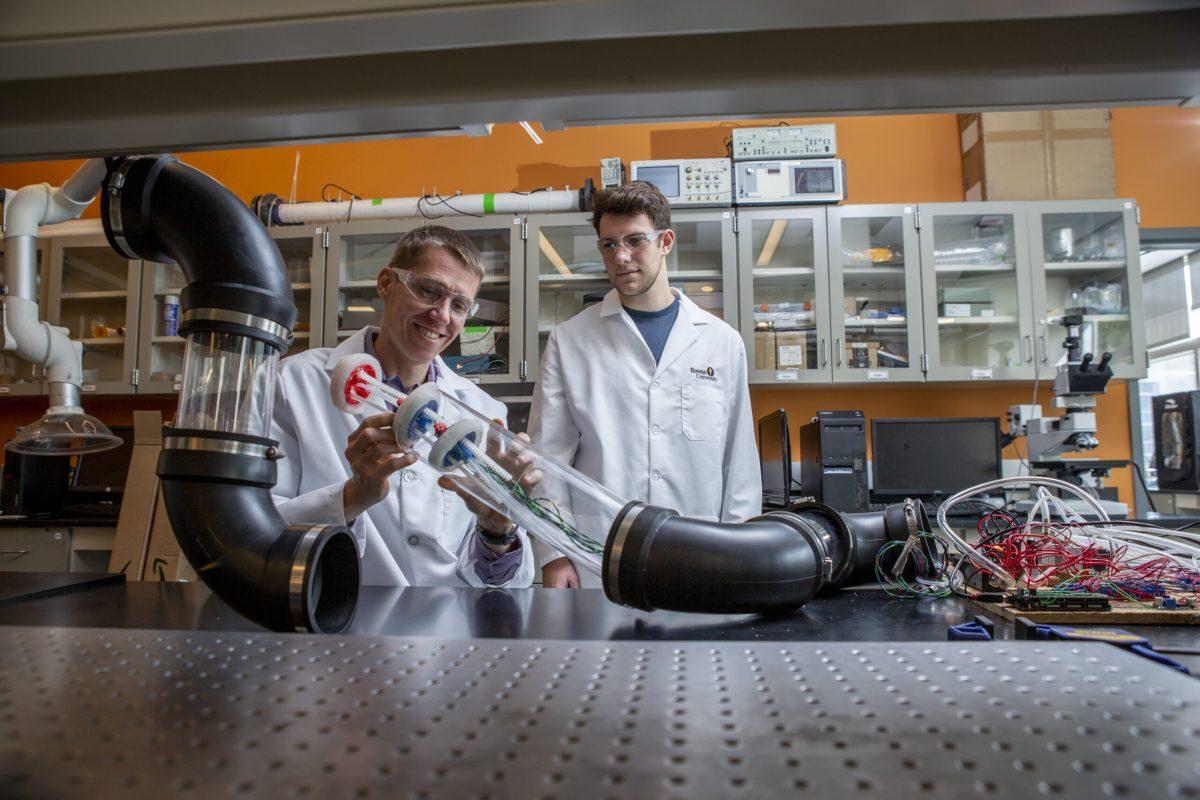Students at Rowan University who are interested in the world of robotics have a new opportunity to take a set of courses that dive into this topic.
A new project led by the Assistant Professor of Mechanical Engineering, Mitja Trkov, Ph.D., and Associate Professor of Mechanical Engineering, Wei Xue, Ph.D., deals with taking a softer style of robots and introducing them to any students who are interested.
Traditional robots are usually rigid, made of hard plastic, or metal, and not as flexible when working with them. Professors are trying to focus on robots that are more human-friendly and are outside of what a traditional robot looks like. The development of soft robotics will create exposure to students with how to handle soft materials, which may be difficult for students who are used to working with steel robots.
This is part of what prompted Dr. Trkov to begin this project, so students are able to become familiar with a new, promising skill.
“This is a new topic and we are trying to enhance this not just by research, but also with the development of education modules, so that is why we proposed this project,” said Dr. Trkov. “The main goal is to enable the education of the soft robots and everything that goes beyond to undergraduate students.”
Dr. Xue believes that there a multitude of inspirations that created this project, which is why they did so much research in soft robotics.
“A big part of this was inspired by nature because the traditional robots as we understand it. They behave like terminators made of stainless steel parts. Well, we are looking at animals like octopus, worms, and snakes and seeing how they move differently than traditional robots.” said Dr. Xue
In order to create these soft robots, they came up with a way to eliminate the stiffness of a traditional robot and made them have a more natural way to their movement. Another inspiration comes from being more eco-friendly with these robotic advancements, soft robots are safer for the environment. The materials that are used to create these robots, when they begin to decompose, do so naturally and produce less waste than stainless steel robots.
Both of the professors agree that its development will be safer when worked on by humans.
“One of the advantages is that they are safe to interact with directly with the human, so if I have a robot that is very rigid it can cause harm to the human,” Dr. Trkov said. “Soft robots, because they’re inherent to comply, can work in close proximity to the human, and it is safer.”
The way that these soft robotics courses will be introduced to the Mechanical Engineering Program is through a new module that allows students to understand the foundations of soft robotics. Students are able to take Introduction to Soft Robotics, which will be offered for the first time in Spring 2024. Students who want to take the subject more in-depth are encouraged to complete a Certificate of Undergraduate Studies in Soft Robotics. For the CUGS, one can take a specific set of courses that sets them up for a number of careers that require this skill once they are certified. Students are also able to present this on their resume for potential future jobs.
Cassandra Jamison, Ph.D., an associate professor and a faculty member of ExEEd, was also a part of the soft robotics project and she believes that these courses will leave a big impact on students.
“Since there will be so much variety in the technical concepts and problems to be solved with the modules, there is potential for students to develop a more holistic view of how engineering works in professional settings,” said Jamison. “I think we are helping to prepare them for careers where they will be working with professionals of many different backgrounds and skill sets.”
She also mentioned that all other engineering majors who are looking for more classes are able to take soft robotic courses and overlap with other courses outside of the mechanical engineering program.
This means that the courses can be applied in other engineering classes and Dr. Trkov, hopes that students take away that main idea of pulling information from other classes and using it to help them understand soft robotics better. He hopes these course modules will prepare students for a future workforce that is focused on all sorts of mechanical engineering.
A new development of technological courses is just the next step for Rowan educators to work on more cutting-edge research to create more programs while providing the students with hands-on experiences on upcoming technologies.
For comments/questions about this story DM us on Instagram @thewhitatrowan or email t[email protected]
























































































































































!["Working with [Dr. Lynch] is always a learning experience for me. She is a treasure,” said Thomas. - Staff Writer / Kacie Scibilia](https://thewhitonline.com/wp-content/uploads/2025/04/choir-1-1200x694.jpg)











































